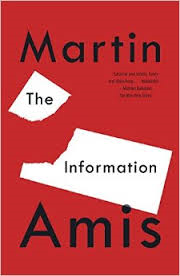Category Archive: WRITING & LITERATURE
I Shall Bear Witness
(by Victor Klemperer) Despite some confusing Anne Frank with a Nazi (see: Rijksmuseum moments), her diary is mandatory reading and so should be this diary of German Jewish academic, Victor Klemperer. He lived in Germany throughout the Nazi reign and this volume, covering 1933 to 1941, reveals the incremental march to holocaust. Each little step led to the next and so on, quickening in pace: May ’33: Klemperer can still lecture in Romance languages and literature at Dresden but he complies with a ‘request’ to no longer conduct exams; by May ’35, he is dismissed from his post; by October…
Continue Reading →The Information
(by Martin Amis) (1995) A glittering specimen of that great archetype, the literary revenger’s tale. Richard Tull toils in vain on his indifferent and overlooked novels – friend Gwyn Barry, at the same time, produces fraudulent, flatulent pulp and is venerated and enriched. Tull decides to ignore the sage words of Richard Nixon when he resigned in disgrace and despair: “others may hate you, but those who hate you don’t win unless you hate them, and then you destroy yourself.” Amis scores a direct hit here: As his fraud’s best-seller sequel, Amelior Regained, is ‘barbarically plain’, this literary revenger’s tale…
Continue Reading →I Like You
(by Amy Sedaris) Indubitably the creepiest, funniest book on hospitality ever written.
Continue Reading →A House for Mr Biswas
(by V. S. Naipaul) With Transparent Things, the best nihilist comedy ever: a long, lovely, sad, frustrating look at defiant failure Mohun Biswas. Full of ‘amazing scenes’ and family strife in Trinidad. When Biswas daubs brightly coloured spots of zinc cream on his face and goes out onto the footpath to watch the world go by, it is hard not to laugh till you cry. The notoriously scratchy Mr Naipaul has produced an impressive oeuvre down the years, but this is certainly his best book. He has written that it is…
Continue Reading →Gyn/Ecology
(by Mary Daly) The Gravity’s Rainbow of feminism, an inspired sample-bag of misogyny, a panoply of male sadism. Arguably an insane tract, nevertheless the facts are there – they are indubitable and to this mere male reader, quite compelling.
Continue Reading →





